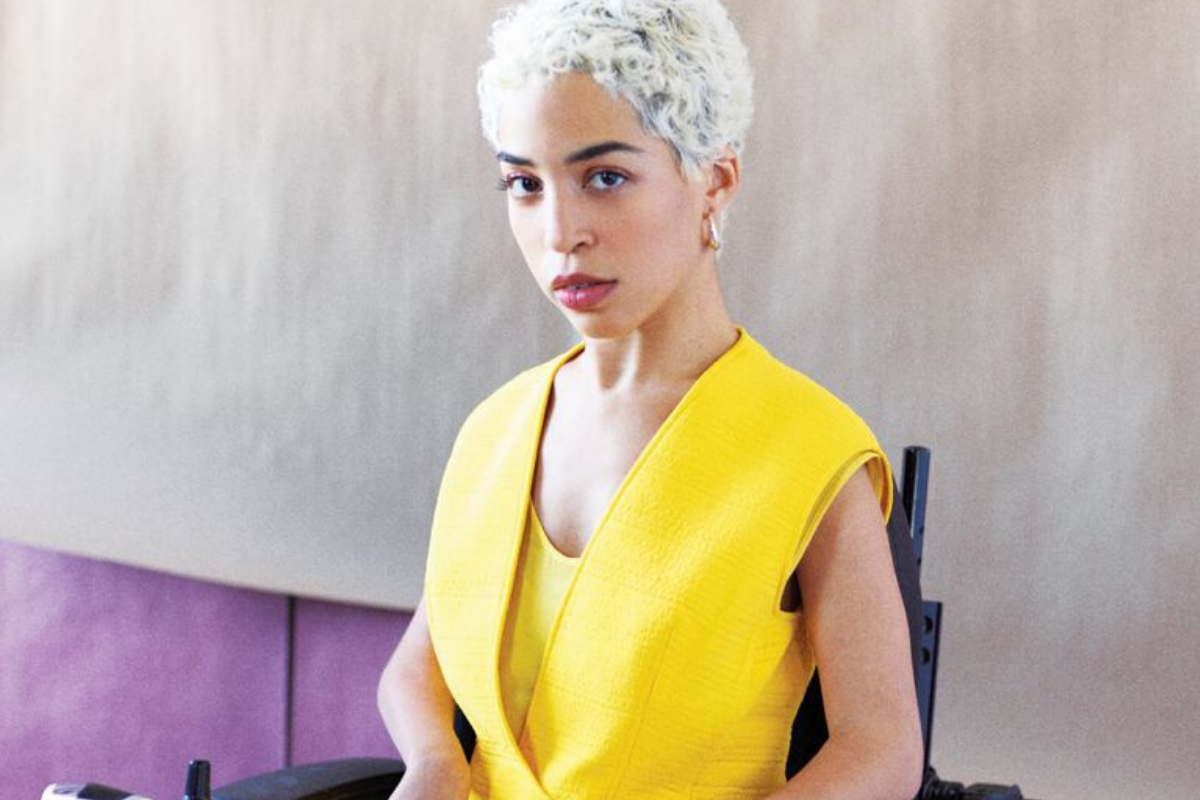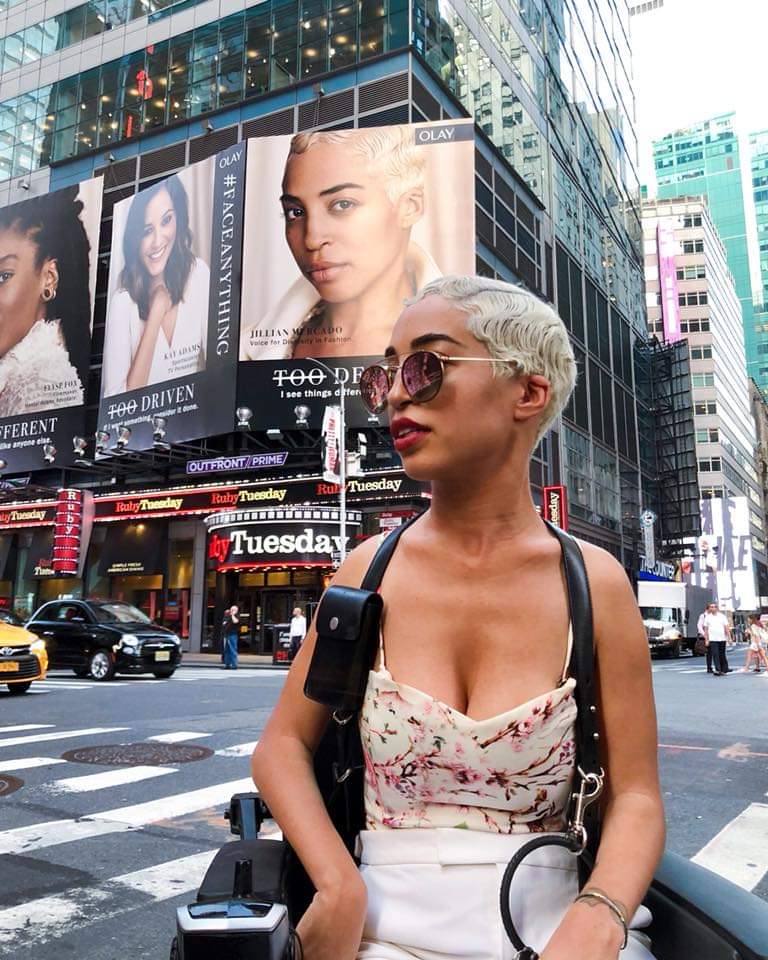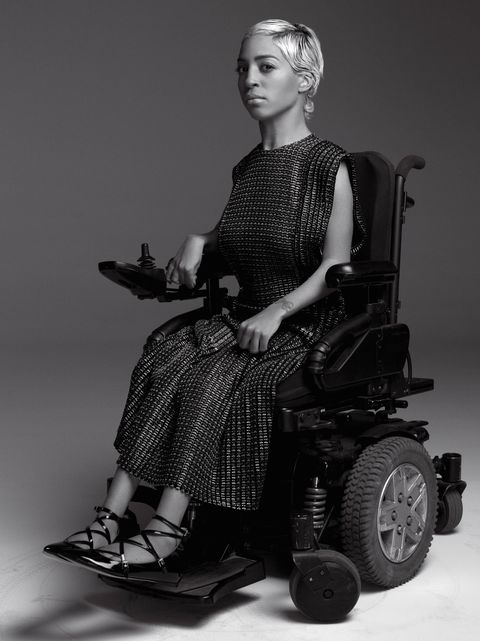

Photo courtesy of Jillian Mercado’s Facebook page.
“I’m here to completely remove the door between disability and fashion.” Jillian Mercado is also breaking down doors between disability and acting—disability and social stigmas, disability and, well, everything she touches.
Diagnosed with Muscular Dystrophy as a child, the native New Yorker is one of only a few professional models in the fashion industry with a disability. I had the pleasure of recently connecting with Jillian. She shared her experiences and thoughts on modeling, disability representation, The L Word and Guillermo del Toro.
Val Vera: First, how are you? How are you dealing with the current global crisis?
Jillian Mercado: Well, it’s a day by day situation, or question for that matter. There are days where I feel extremely productive and keep myself busy with reading, writing, learning something new or exercising at home. Other days, making my bed in the morning seems like a job. We are in a weird bizarre time in our lives so it’s not easy to describe how I am personally dealing with it. I am hopeful that this will all pass soon.
VV: I understand your early interests in fashion came at a young age. Your mother worked as a seamstress and your father as a shoe salesperson. What interested you in the work that your parents did? How and when did those interests evolve into a vision of becoming a model or working in fashion?
JM: I can’t exactly pinpoint or remember what interested me the most when I was younger, but I would say the colors and how excited/dedicated they were every time I would ask questions. My interests became reality in high school while signing up for colleges. I was speaking to my mom and she said whatever I end up doing, she will support me as long as I am happy. I had to really think about what I wanted to do and went through many career options. After a visit to New York’s Fashion Institute of Technology, I realized this is where I belonged. Where I felt the happiest.
VV: Your credentials include campaigns with Diesel, Beyoncé and Target. Thinking back to those experiences, what stands out the most? Can you describe the first time you realized that “you made it”?
JM: I think I still have trouble understanding when I made it or if I still need to make it. The first time that I knew that I was on the right path was when I worked with Diesel, my first official modeling job. I saw a 50-foot poster at the airport in Italy. My poster was just sitting there by itself while others would pass by. That’s how I knew I had such an impact on the world.


Photo courtesy of Jillian Mercado’s Facebook page.
VV: Disability representation in the fashion and entertainment industry is growing, but has a long ways to go. At what point in your career did you realize that you’re one of only a few disabled models in the industry? Do you see yourself as a role model for other aspiring disabled models?
JM: From the very beginning. When I was in high school looking through magazines and watching television, I realized that nobody really looked like me. Yet, I knew that there were so many people in the world who had disabilities. I really could not understand. I originally wanted to become an editor so I could hire a bunch of people like myself and put them in the forefront of, in this case, fashion.
It has taken me a while to recognize that I am a role model to other aspiring disabled models or models in general. I know that I am paving the way to something that hasn’t been done before, in the way that I have always envisioned it to be. I know how valuable and worthy our experiences and stories are so I use that to propel and to continue to do the work that I do.
VV: Disabled bodies vary and are often seen as non-normative by non-disabled individuals. Does fashion look or even feel different for disabled individuals? Should it look or feel different? Does functionality in fashion play an important role considering the varying needs disabled people might have? What is your favorite fashion item that you own right now? Why?
JM: Disabled bodies look non-normative to people who don’t have disabilities because it’s different to them. People fear different, which is something that is extremely disheartening to realize. This is why people like myself who are in those spaces speak up.
The feel and look of fashion is different for people who have disabilities. It shouldn’t be something negative or difficult to swallow. Disability is just another layer of who we are, it’s a part of us and that shouldn’t be looked at as something negative, but instead something to contribute to the rainbow that is our world.
Functionality has to play a part in fashion, especially for people with various needs. The disability community shops as well, we get dressed as well, we are consumers of these brands. If they can take our money, accommodating and representing us in the brand shouldn’t be hard at all.
Personally, I am a fan of jackets, specifically leather jackets. It symbolizes strength and badass, which is what I am and how I identify.


Photo courtesy of Jillian Mercado’s Facebook page.
VV: I understand you’re a big fan of Guillermo del Toro. I am as well. Shape of Water was beautiful! What is it about his work that inspires you? If you could pitch a story idea in which you starred as the main character (directed by Guillermo), what would it look like?
JM: Such a beautiful movie! All his movies are just beautifully executed. Not only is he Latino, which I am as well, he also has his own stamp to every movie that he does. I respect people who no matter what they’re given, will always stay true to who they are. He also reminds me of one of my all-time favorite fashion designers Alexander McQueen. Both of them have a unique look at how humans act and look like, whether it’s glamorous or scary. He shows the reflection of what we refuse to see.
If I can have the opportunity to pitch him a story… I honestly would probably freak out. I don’t know if I can ever pitch a story that will be better than something that he would pitch to me. I just want to be a mystical creature in one of his movies.
VV: As a disabled Latina, your experiences are viewed or lived through an intersectional lens. How does your Dominican identity and upbringing play a role in your career? Is there a lack of Latina(x) representation in the industry?
JM: Absolutely, which gives me even more of a unique perspective. My Dominican identity comes in all the work that I do. I used to travel to the Dominican Republic every other summer to learn about my culture and where my parents grew up. I use my platform to talk about situations or things that I can push forward as far as politics or disability for that matter. I also am fluent in Spanish, so I can connect to a bigger crowd as well.
I don’t think there is a lack of representation in the Latino Community, but I do believe that there is in the American platform, white America. I do believe that our community is always in the back burner of many entertainment platforms. There is so much work to be done as far as representation, a real representation of our community told by our lens, not somebody else’s. It’s been the norm for way too long. We can see that as we talk about our own stories, things start to make sense.
Photo courtesy of Jillian Mercado’s Facebook page.
VV: Let’s talk about your role in The L Word: Generation Q. How did it happen and describe your experience, specifically from the disability perspective? You play Maribel Suarez, an immigration attorney… any similarities between Maribel and Jillian?
JM: I was given the script through my entertainment agency… they asked me if I wanted to audition for this role that was specifically designed for someone with a disability, a visible disability. She had to be Latina and have a disability, which I am both!
As you probably know, disability has truly never been told from the perspective of someone who actually has a disability, which ends up giving a false storyline to people who actually do. Yet those shows/movies end up winning Oscars or Emmys. Unfortunately, that has affected our community greatly and people have a false sense of who we are—undermining or questioning everything we do.
This opportunity was more than just another job. It was an opportunity to make my way into an industry so they can hear me, my perspective, my story. Giving the opportunity to someone with an actual disability shows the world what it really means to be someone like myself. I am blessed to have a team of people and writers who bring me on to talk about how they can involve my story into my character. Authenticity was extremely important to them.
My character is very much like myself! My family members… my sisters and mom are like my best friends. I too take my work and career very seriously, but I also have an extremely fun and sassy side. Just wait until next season! Maribel is going to be in some adventures!
VV: Lastly… What does the Jillian Mercado brand look like 5-10 years from now?
JM: Most likely absolute world domination! Where looking to the right and left you’ll see something that I have done or been a part of. Honestly, when I put myself into a project or something that I dedicate myself to, I go all the way without looking back. In 5 years, I know that I’m going to accomplish a lot of amazing things.
***
Val Vera is a writer who covers disability culture, lifestyle, politics, law, and technology. He tweets from @ValVeraTX.


